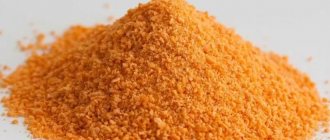Vinegar is needed not only as a preservative for winter preparations. It is used for preparing salads, cold appetizers, marinating meat, etc. This liquid has found its application in many other areas of our lives, including removing rust stains, cleaning and disinfecting plumbing fixtures. Despite the fact that almost every home has this product, not everyone knows where and how to store vinegar.
How to choose
- Vinegar (apple vinegar, table vinegar or its essence) must be in a hermetically sealed container with a label that clearly indicates the release date and shelf life.
- Particular attention should be paid to the composition of the product. It must be made exclusively from natural raw materials. If we talk about an apple product, it should be made from apples, not acetic acid.
- Table vinegar cannot be cloudy or contain various impurities. Its absolute transparency is one of the signs of a quality product. But apple and wine may have sediment. They are not filtered during the production process.
- Balsamic vinegar is considered high quality if it has a dark color and a slightly viscous structure.
How and how long to store balsamic vinegar
Balsamic has been produced for over 600 years. Its main mass production began in Italy. To get real balsamic vinegar, you need to age it for at least 6 months, and preferably 3 years. Balsamic is made only from grape juice of certain varieties, which is why it has such an attractive and unusual taste.
When purchasing balsamic vinegar, pay attention to the production date. The “older” the vinegar, the better it tastes. You can buy young vinegar, but then keep the bottle closed at home for another 1-2 years. However, for aging you need an airtight container. If you bought vinegar and immediately opened it, it may then sit for a very long time, but it won’t make it any better. Balsamic vinegar aged for 12 years has the richest taste.
If we are talking about ordinary store-bought vinegar, but after opening the bottle its properties are quickly lost. This vinegar should be stored at home for no more than a year in a dark and cool place at a temperature of 6 to 20 degrees.
See also:
Other site materials
How long to store milk in the refrigerator Don't know how long you can store opened milk in the refrigerator? This article will help you!
How long to store eggs in the refrigerator Did you buy a lot of eggs? We will tell you how long you can store eggs in the refrigerator
How long can egg whites be stored in the refrigerator Athletes and health practitioners often separate the whites from the yolks for dietary nutrition. Read this helpful article on storing egg whites
Blackcurrant storage Many children and adults adore currants. Its taste and benefits are difficult to overestimate. We will tell you everything about storing currants!
How to preserve pancakes We fried a lot of pancakes. From our article you can find out how to keep them fresh longer.
How to store halva Halva is everyone’s favorite oriental dessert. Find out all the secrets of storing halva from our new article.
Comments:
Storage conditions
Manufacturers indicate that the storage temperature of vinegar can range from -3°C to +35°C. But, for example, balsamic and apple varieties of this product should not be stored in the refrigerator (when cooled, they cannot fully reveal their qualities).
Storing vinegar has no time limits if it is kept in a glass, hermetically sealed container in a dark, cool place.
Plastic containers are not suitable for long-term storage of vinegar. It can remain in such a container for about 4 years (indicated by the manufacturers).
How to make apple cider vinegar at home - 3 recipes
Apple cider vinegar, prepared at home, is now increasingly being added to broths, various fish, poultry, and even seafood dishes.
When pickling, such a product is one of the main ingredients. And it’s not surprising: the taste of the dishes is more varied and interesting.
Natural vinegar is made by fermenting apples, sugar and yeast, without adding unnecessary ingredients or chemical additives.
Before you start cooking, you need to know some subtleties and recommendations:
- Much depends on the choice of apples, so this process must be approached carefully. It is best if these are not sour, but sweet varieties. The fruits must be free from rot and worms, so spoiled fruits are not suitable.
- If the recipe uses sugar, it can be replaced with another healthier ingredient - honey.
- During the cooking process, foam usually appears on top and is the most useful, so it is not recommended to remove it. It is enough just to stir the liquid periodically.
- The product takes a long time to prepare, about two months, so you will have to be patient.
- When you need to pour liquid into a container or selected container for preparation, do not forget to leave a little more free space.
- The area for fermenting ingredients should be warm and dark.
- Utensils for preparing vinegar are either glass or clay. It is best to use a wooden spoon or wooden stick for mixing.
Apple cider vinegar recipes vary in the number of ingredients (besides apples) and complexity of preparation. The simplest and most cost-effective method involves only apples.
Recipe No. 1 (the simplest, only from apples):
- Take the required number of apples (one and a half or two kilograms are recommended), wash them thoroughly and dry them. Then cut each fruit into four parts, discarding the seeds. Next, the apples should lie in this form until they darken.
- At the next stage, you need to squeeze the juice out of the fruit and pour it into a previously selected clean container for preparing vinegar.
- The container must be closed with a rubber glove and the glove secured with thick thread, twine or an elastic band.
- Now the container needs to be sent to a dark but warm place and wait until the glove swells. Usually this process takes 4-6 weeks, no more.
- When the glove swells, transfer the half-ready vinegar to another container and cover it with a thick cloth or towel. And put it back in a warm and dark place for another few weeks.
After about eight weeks, the apple cider vinegar should become clear, at which point it is ready.
Now all that remains is to strain it, pour it into bottles (necessarily glass) and store in a place where sunlight does not penetrate.
Recipe No. 2 (with added sugar and water)
- You need to take two kilograms of ripe apples, wash them and place them in a glass jar.
- Pour cold boiled water over the fruits (a liter of water is taken for 1 kg of fruit), add one and a half glasses of sugar and cover the jar with a not too thick cloth (cotton will do).
- Move the container to a warm and dark place and leave for at least three months. The fruits need to be stirred periodically.
When the vinegar becomes clear and there is no pungent odor, the product is ready and should be strained in the same way and poured into clean bottles with a lid.
Recipe No. 3 (with honey and yeast)
This recipe was once invented by an American doctor. It also takes a long time to prepare and requires a little more ingredients, but in terms of quality and benefits it surpasses all other cooking methods.
How to make apple cider vinegar with honey and yeast:
- First you need to take the apples, wash them properly and get rid of the core.
- Then the fruits must be grated or very finely chopped.
- Place the resulting apple mass in a ceramic or glass bowl and add warm boiled water. Water should be taken at the rate of one liter of water per kilogram of apples.
- Next, you need to add natural honey (one third of a glass of honey is taken per liter of liquid).
- After this, you need to add a little yeast (bread) and dried rye bread - a couple of pieces.
- The container should be covered with a thin cloth or gauze and kept in a dark and warm place. You need to wait 10-12 days, then strain the mixture and add honey again in the same quantities.
Now the composition should be infused for up to two months: it will be ready when the liquid is clear. At this stage it is filtered and bottled, as in previous recipes.
Where and how to store apple cider vinegar
A component such as vinegar is often added during pickling so that food does not spoil and is stored longer than necessary. But the vinegar itself, no matter what it is, also needs to be able to be stored correctly, because it does not like exposure to sunlight.
First of all, any vinegar needs a suitable container. Bottles made of plastic or metal are completely unsuitable for this, as further oxidation or unnecessary reaction with the plastic will occur.
Glass bottles with a tight-fitting lid are best so that the vinegar does not lose the necessary beneficial properties.
It is advisable to choose a cool place for storage, but the refrigerator is not suitable for apple cider vinegar, as it may subsequently lose its taste. For vinegar made from apples, the pantry may be suitable, since there is no light or other sources from which the container can heat up.
How to store vinegar
It is not advisable to store any types of this product in plastic or metal containers. This is due to the interaction of these materials with acetic acid.
As a result of oxidative reactions, a large number of substances are released that are considered toxic and may pose a threat to human health. Therefore, long-term storage of vinegar is possible only in glass, hermetically sealed containers.
Useful tips for housewives
Apple cider vinegar is simply irreplaceable in the household, both for preparing a variety of dishes and for cleaning various items when cleaning. Using our advice, any housewife will be able to bring perfect cleanliness to her apartment.
- This product can disinfect vegetables, fruits, and kitchen utensils. A glass of oceta is poured into a liter of water - the liquid is used for washing.
- If you need to extend the shelf life of fish or meat in the refrigerator, you can wrap it in a rag soaked in a water-vinegar solution (mix in equal parts).
- To remove unpleasant odors after cooking fish in the kitchen, you need to spray it with ocet before cooking it. You can get rid of an unpleasant smell in the refrigerator by wiping its shelves and walls with a rag soaked in vinegar.
- You can improve the taste of a peppered dish by adding a small spoon of vinegar.
- A water-vinegar solution, prepared in a 1:1 ratio, helps in expelling house ants - you need to spray the places where there are a lot of them, as well as the paths along which they move.
- This product is capable of removing scale from kettles and pots - just boil a container with it.
- Vinegar rinses and wipes add shine to crystal items.
- By rubbing with a mixture of baking soda or table salt and acetic acid in equal proportions, you can remove stains from tea or coffee on cups.
- A mixture of salt (two large spoons) and vinegar (one large spoon) will help get rid of plaque on the tap.
- It is easy to remove old stains in a microwave oven by preheating a container with one part vinegar mixed with one part water for five minutes.
Thus, apple cider vinegar is a beneficial remedy used in various areas.
Most often - in cooking. However, it is often used to treat various diseases. Those who have tried folk remedies with ocet claim that it is good for strengthening and adding shine to hair, getting rid of corns, improving the condition of varicose veins, relieving fever, and eliminating sweating.
Today it is also a particularly popular remedy for weight loss and getting rid of cellulite. However, it is important to adhere to the dosage during treatment, since excessive consumption of the product leads to negative health consequences.
For therapy, it is better to use vinegar made at home. The process of preparing it is simple, but fermentation occurs over a long period of time - from one and a half to two months.
The original product must be in a dark bottle that does not allow sunlight to pass through. And it will not contain various dyes, preservatives and other chemicals.
Where to store
- It is recommended to store vinegar in dark, cool pantries or cabinets located far from heat sources.
- On a windowsill or table exposed to sunlight, this product will soon begin to ferment. The formation of sediment in table vinegar is a sign that it is spoiled; there is no point in storing it any longer.
- If you accidentally consume this product in large quantities, it can lead to tragic consequences. Therefore, an important rule for storing it is considered to be inaccessibility to children .
- The shelf life of vinegar at room temperature is 12 months from the date of manufacture.
Expiration dates
The shelf life of apple cider vinegar depends on how it is produced. The homemade product must be used within 6 months. It is during this period that its positive properties and necessary strength are preserved.
The product from the store can be used for 12 months. Typically, increasing the shelf life of apple cider vinegar is achieved by adding preservatives to its composition. Therefore, before purchasing, you should carefully study the labeling on the packaging. Acetic anhydride has the longest shelf life - 2 years from the date of production.
Keep an eye on the expiration date to ensure that you only use quality products.
A clear sign that the vinegar has gone bad is the appearance of a cloudy sediment. If the product was prepared yourself, you can simply strain it through cheesecloth and continue to use it. Store-bought should be thrown away immediately.
Many people use vinegar for cosmetic purposes, the expiration date of which has already passed. They explain this by the fact that manufacturers indicate dates on the packaging with a small margin.
Accordingly, the product retains its properties for some time, so it is suitable for preparing medicinal hair masks or nail baths. You should still not eat expired vinegar, as the consequences of poisoning can be serious.
As you already understand, apple cider vinegar is not overly whimsical. Any housewife can organize its proper storage at home. Follow the rules and get from consuming this natural product all the benefits that nature has given it.
Storing Apple Cider Vinegar
- Store-bought apple cider vinegar should be stored at a temperature between 0°C and +35°C. And if you make it yourself, it’s better to keep it at +6°С -+15°С.
- Apple cider vinegar can be stored in the refrigerator, cool pantry, cellar or basement.
- If the product begins to form a brown sediment during storage, this is considered normal. It will need to be strained before use.
- Storage periods may vary. It depends on the cooking method. If it is a home-made product, it can be stored for 6 months, and if purchased in a store, it can be stored for more than 1 year.
- The anhydride can be stored for up to 2 years from the date of release.
Factors affecting the shelf life of vinegar
It would seem that vinegar is a preservative, which means what could happen to it? In fact, it should preserve itself, but this is not the case. It also has its own shelf life, which is influenced by a number of factors:
- Ambient temperature . Normally, the preservative retains its properties and quality at temperatures from 0°C to +35°C degrees. Although the temperature parameters are wide, you should pay attention to the conditions indicated on the packaging.
- Tara . Safety largely depends on the container in which the product will be located. The most advantageous option is a glass bottle. Containers made from other materials will react with acetic acid and lead to the release of sediments and toxins.
- Temperature fluctuations . The place for the product should be chosen away from various heat sources such as electric heaters, stoves, radiators, etc. Prolonged close proximity will start the fermentation process.
- Ultra-violet rays . Exposing the liquid to direct sunlight will also cause fermentation.
Storing table vinegar
- This species can be stored for a very long time if it is not stored in a plastic container. Therefore, immediately after purchasing it, it is better to pour it into a glass container, tightly close the lid and store it in a cool, dark place.
- A purchased table product that has already been opened can be stored for up to 12 months. at +6°С -+20°С. If sediment begins to form in it, it cannot be stored further and can only be used for domestic purposes.
- Various herbal and other tinctures based on this product can only be stored on the refrigerator shelf for no more than 1 month.
In what container should I store it?
For apple cider vinegar to be beneficial, it must be properly stored at home. A natural product, like acetic anhydrite, has a destructive effect on plastic. He is able to dissolve it quite quickly. During this process, harmful substances from the plastic enter the liquid. You should not eat this product. Therefore, you cannot leave it in a plastic container for a long time and after purchase it is better to pour it into another, more suitable bottle.
Also, due to the large amount of acids in the composition, it cannot be left in metal containers. The liquid quickly oxidizes iron and becomes unfit for consumption.
Maintain the benefits of a product prepared from ripe, juicy fruits correctly
Glass containers are optimal for long-term use. You can store vinegar in it for as long as the expiration date stipulates. A glass bottle preserves all the taste and nutritional value of the product. Darkened containers are considered the best.
How to use the skin product
If you want to pamper your skin a little, be sure to use apple cider vinegar to make homemade emulsions or serums. The substance has an excellent effect primarily on the skin of the face. A variety of lotions, peelings, and masks based on this substance perfectly tone the skin of the face, smooth out small expression lines and wrinkles on the forehead. Use the product to prepare special masks that will help fight facial skin problems.
It is necessary to use a liquid with a concentration of no more than 15%, since this is the safest amount.
How are these periods regulated?
The expiration dates and technical storage conditions of all food products are regulated by the provisions of various state standards. Vinegar is no exception: GOST No. 56968 of 2021 applies to it. and GOST No. 32097 of 2013, developed by the All-Russian Research Institute of Food Biotechnology.
- GOST No. 56968 applies to table vinegar - an aqueous solution of chemically synthesized acetic acid.
- GOST No. 32097 prescribes the rules for storing vinegars made from food raw materials (apples, grapes, etc.).
- Also, the expiration dates of this group of food products are regulated in government decree No. 720 of 1997.
The specific shelf life of vinegar, according to the requirements of the Russian state standard, must be established by the manufacturer himself. They depend on the production technology and the raw materials used. The shelf life period begins from the moment the product is manufactured, and not from the time it is poured into retail packaging. However, on packages with foreign products you can sometimes find the “Bottling Date” marking, which does not comply with the conditions of Russian technical regulations.
Marking according to GOST
Any container intended for bottling vinegar must be marked in accordance with the technical regulations adopted in the countries of the Customs Union. This applies to both small bottles for retail and barrels in which vinegar solutions are supplied to industrial enterprises. Among other things, the label must indicate:
- Date of manufacture of the product. In addition to the label, this data can be applied directly to the container or to the lid (stopper).
- Its expiration date is from the date of manufacture.
- Storage conditions. For products whose quality may change after the sealing of the original packaging is broken, the shelf life after opening is also indicated.
Despite the established standards, you can find packages on the counter that indicate expiration dates that significantly exceed those established by GOST standards. For example, for apple cider vinegar, the labeling may contain the following information: “Shelf life is unlimited” with the note “Subject to storage conditions.” On packaging from other manufacturers you can find 3 or 4 year markings.
According to the above standards, the shelf life of various types of vinegar depends on the raw materials used for their production. Subject to compliance with the packaging standards and storage conditions defined by GOST, they are:
Useful properties of vinegar
It is important to remember how to store apple cider vinegar so as not to lose its original qualities. When used in moderation, the component has a positive effect on the body.
Do you use expired food for cooking at home?
Yes, the main thing is to process it if it is meat or expired kefir for pancakes.
27.72%
No, it is very dangerous and not useful.
36.37%
If the products have fungus or mold, then we throw them away; if they are a couple of days past their expiration date, we use them for food, even without heat or other treatment.
35.91%
Voted: 1952
- Has a positive effect on the nervous system.
- Relieves excessive bleeding during menstruation.
- Good for the heart.
- Is an antioxidant.
- It has a beneficial effect on digestion and the vascular system.
- Activates the formation of red blood cells.
At the same time, fruit acid is widely used in various fields - cooking, cosmetology, medicine and in everyday life. The component is able to polish windows, add shine to leather clothes and shoes, and eliminate pathological microorganisms on things. Vinegar improves the immune system and normalizes blood pressure. In addition, it can even help strengthen hair and stabilize weight.
In order for it to remain useful, you must follow all storage rules. Otherwise, it may spoil prematurely, after which it will need to be thrown away.
Every person has vinegar in their home, because it is required for various culinary recipes and even for cleaning plumbing fixtures. Some people can store it for years, since the component is used sparingly. At the same time, it is important to consider the shelf life of table vinegar so as not to run out of time. You will need to properly store the ingredient so that it does not spoil before the appointed time.
Use of wine vinegar
Wine vinegar is especially often used as part of a marinade or as a dressing for a finished dish. Vinegar goes perfectly with any meat, but is absolutely not suitable, for example, for fermented milk products and fried or baked potatoes.
A good housewife often uses wine vinegar as a detergent; by the way, in this case, it is ideal to use expired vinegar. With its help, the room, countertop, dining table is disinfected, and also gives incredible shine to the dishes. Cleaning with a vinegar disinfectant (pour 1 liter of clean cold water and 1 tablespoon of wine vinegar) is absolutely safe for children.
The healing properties of wine vinegar are also known. It can be used as a disinfectant for scratches, wounds and cuts, and also, for bruises, as a pain reliever. The astringent properties of wine vinegar will help cope with skin irritations. In addition, vinegar is well known to relieve pain from sunburn. For medicinal purposes, wine vinegar is allowed to be used only for topical use.
Since ancient times, women have used wine vinegar as a skin and hair care product. Women gave their hair incredible shine, strength and silkiness by rinsing it with vinegar water. In addition, constant use of such water helps prevent premature hair loss and also make it thicker.
How can varicose veins be cured?
Varicose veins occur due to the outflow of blood from a certain part of the body. This is the body's reaction to such drastic changes. Symptoms include very noticeable swelling of the arms or legs, if you get tired from walking for a short time, if you notice how your veins are rapidly swelling.
Take a glass of pre-boiled water and add a few tablespoons of apple cider vinegar. Take the resulting mass orally twice every day. In addition to internal influence on the disease, use the method of external influence. To do this, take a cotton swab or cotton pad and soak it in a small amount of apple cider vinegar, then rub it thoroughly into the places where your veins are blue and swollen. After a week you should feel a noticeable effect from this type of treatment.
Methods for clarifying vinegar concentrate
Even after 45-60 days of aging, the uterus settles to the bottom, the vinegar remains cloudy. People complain about this problem when making a bite. But sometimes this phenomenon occurs even among experienced owners. How to drink apple cider vinegar, if it is cloudy and has sediment, should it be clarified?
Only filtration will help, double or triple if required. The vinegar is filtered through a sterile cotton pad and then left again in a dark place for a couple of days. Do not shake the container at this time. If this doesn’t help, that’s okay. Cloudy vinegar is no worse than clear vinegar; it is healthy and not dangerous to health. But the look is less aesthetic.
Making apple cider vinegar at home
Natural vinegar at home is prepared from ripe fruits (unlike store-bought vinegar, which is based on apple waste: peels, cores). There are two main methods of production: from apple pulp or from juice. sweet apples for vinegar production . More sugar will need to be added to the base of sour apple varieties. The fruits must be ripe; the use of overripe fruits is allowed, and even recommended. It is also allowed to take carrion, but only when there are no signs of rotting on the apples.
Specifically, sugar is the second essential component of otsta (although you can also find recipes without the use of sugar). Granulated sugar can be replaced with honey. In addition, some recipes for making homemade apple ozt include adding dry or live yeast , black bread or rye crackers.
Vinegar comes out as a result of fermentation of juice from apples. After complete fermentation of the resulting alcohol, acetic acid comes out. During natural fermentation, a foam or film appears on the surface of the wort, which resembles kombucha - a vinegar mother. It is not removed under any circumstances.
It is best to prepare otset in a three-liter glass container. However, glass bottles are also permitted. In addition, it is easier to fill the necks of bottles with paraffin so that the resulting product can be preserved for as long as possible.
Which vinegar is better: synthetic or natural?
Natural vinegar, which is made from apple cider, is several times more expensive than synthetic vinegar. Natural apple cider vinegar is 5% ABV, while synthetic apple cider vinegar is usually 9%. You need to be completely sure that you really bought natural apple cider vinegar and not a chemically flavored one. Too frequent consumption of synthetic vinegar can lead to sand and kidney stones, duodenal and stomach ulcers, as well as acute nephritis and nephrosis.
Also note that store-bought apple cider vinegar should not be used while on a diet. In this case, only vinegar made with your own hands from first-class greenish apples will do.
Nuances
Among the nuances regarding vinegar, the following should be highlighted:
- Cloudy vinegar is suitable for use because over time the sediment will sink to the bottom.
- It is not necessary to add yeast during production; you can do without it.
- Vinegar will ferment longer in a jar than in a bowl or pan. This is due to the small area of contact with air.
- Apple cider vinegar is fermented juice. Juice and vinegar have different chemical compositions.
- Apple cider vinegar has a shelf life of approximately two years. Different types of octa may have different shelf life. If you purchased apple otset at a pharmacy or store, you can look at the expiration date on the packaging.











